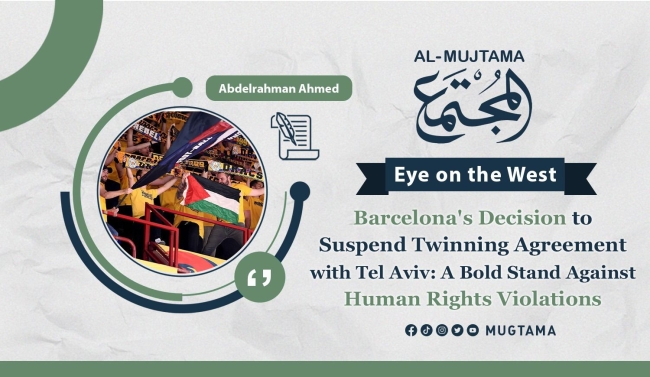Barcelona's Decision to Suspend Twinning Agreement with Tel Aviv: A Bold Stand Against Human Rights Violations
The political landscape surrounding the Israeli occupation has long been fraught with tensions and controversy. Recently, the city of Barcelona made headlines by announcing the suspension of its institutional relations with Israel, specifically severing ties with its twin city, Tel Aviv. This decision, according to Barcelona's mayor Ada Colau, is a response to the "systematic violation of Palestinian human rights" by Israeli authorities. The move has stirred discussions globally, highlighting the intersection of politics, human rights, and municipal diplomacy.
Ada Colau's Statement:
Ada Colau, the mayor of Barcelona since 2015, made the announcement in a press conference, stating that the decision was influenced by the appeals of over 100 organizations and more than 4,000 citizens advocating for the defense of Palestinian human rights. Colau emphasized that the suspension of institutional relations, including twinning agreements with Tel Aviv, would persist until Israeli authorities put an end to the alleged systematic violations of Palestinian human rights.
Public Support and Activism:
The decision to suspend relations came after activists from left-wing parties and the Boycott, Divestment, and Sanctions (BDS) movement successfully collected signatures from 5,000 Barcelona residents on a petition urging the severance of ties with Tel Aviv. The petition underscored the Israeli occupation's continuous commission of what it labeled as "ongoing crimes" against the Palestinian people, including the deaths of thousands, including hundreds of children, in pursuit of what it was deemed a "systematic ethnic cleansing" and apartheid.
In her message to Israeli Prime Minister Benjamin Netanyahu, Mayor Colau reiterated the petition's call for the condemnation of racial segregation against the Palestinian people, support for Palestinian and Israeli organizations working towards peace, and the annulment of the twinning agreement between Barcelona and Tel Aviv.
Historical Context of Twinning Agreements:
Twinning agreements between cities are traditionally established to foster cultural exchange, economic collaboration, and mutual understanding. Barcelona and Tel Aviv signed their twinning agreement in 1998, with a focus on enhancing cooperation in various areas, including urban development, tourism, and the economy. The decision to suspend such an agreement is unprecedented and signals a departure from the normative framework that has governed municipal diplomacy.
International Reaction:
The significance of Barcelona's decision is underscored by its status as the first municipality to sever ties with Israel. The move has been praised by the National Palestinian BDS Committee, the broadest coalition in Palestinian society leading the BDS movement, commending Barcelona's mayor and the grassroots groups that played a role in achieving the freeze of institutional relations. The committee emphasized that Barcelona's action should serve as an example for other governments, municipalities, and institutions globally to impose international isolation on Israel, hold it accountable, and pressure the United Nations to investigate the alleged crime of apartheid.
Controversies and Opposition:
However, the decision has not been made without controversy. The Israeli newspaper Yedioth Ahronoth highlighted the importance of the twinning agreement in fostering cooperation between the two cities, particularly in tourism and the economy. The Union of Jewish Communities in Spain criticized the decision, describing it as "antisemitic" and expressing regret that it does not reflect the true essence of Barcelona and its citizens.
Barcelona's decision to suspend its twinning agreement with Tel Aviv stands as a courageous step in the face of the Israeli occupation. The move is indicative of a growing global awareness of and opposition to the systematic human rights violations by the Israeli government. While the decision has generated both support and criticism, it opens a new chapter in the role of municipal diplomacy in addressing international conflicts and human rights issues. As the world watches, the implications of Barcelona's bold stance may extend beyond the city limits, influencing other municipalities, governments, and institutions to reevaluate their relationships with nations accused of violating fundamental human rights.


